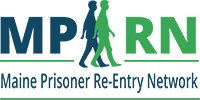Connecting Maine’s Re-Entry Community
As we enter the summer months at the Harward Center and begin planning for the upcoming year, we always enjoy taking stock of the projects that happened over the previous year and thinking about how good work can be continued. Over the past several years, we have been developing a robust partnership with the Maine Prisoner Re-Entry Network (MPRN), and we were delighted that this partnership continued and grew in several different ways this year, in spite of the challenges created by COVID-19.
The MPRN takes a community-based approach to supporting citizens who are reentering society after incarceration. Even in normal circumstances, finding affordable housing, healthcare, and community can be an enormous challenge for those who have spent time in the prison system. By cultivating networks of support that include care providers and mentors who have firsthand experience navigating re-entry, the MPRN helps returning citizens overcome these hardships, and in doing so works to reduce recidivism. One of the biggest challenges the MPRN faces while helping citizens rejoin society is the significant stigma confronting anyone who has been incarcerated. After talking with MPRN coordinator Bruce Noddin last spring, Anah Witt, a January 2021 graduate, developed a series of presentations and discussions that would address some of the misperceptions that face reentering citizens. Even though COVID restrictions temporarily halted the series after it started last year, Anah, Bruce, and others within the MPRN worked together to adapt the format to Zoom. This year, the series included presentations on the impact of incarceration on families, the racialization of incarceration, and the role that activism can play in improving conditions for those inside. By all accounts, the series was a tremendous success, helping to raise awareness and build new connections with individuals around the state who attended virtually.
Virtual networking has supported the work of the MPRN in other ways as well. With visitation in the Maine State Prison system either halted or significantly restricted to prevent the spread of COVID-19, the MPRN pivoted from providing pre-release, in-person consultations with incarcerated people to providing similar support over Zoom. Taking advantage of increased opportunities to connect with those on the inside virtually, the MPRN began hosting weekly Zoom meetings that brought together incarcerated individuals and advocates and care-providers from around the state. These virtual meetings facilitate relationship-building with a much wider network of support than would ordinarily be possible with the constraints of in-person visitations. As such they provide a promising model for improving re-entry even after COVID-19 restrictions ease. For her senior Honors Thesis in sociology, Emma Block has been attending these virtual meetings and working with Bruce and others within the MPRN to evaluate the ways that the networking opportunities provided by virtual meetings can impact the experience of re-entry. By working to collect both qualitative and quantitative data from people who have participated, Emma is helping to provide a foundation for advocates who want to continue and expand virtual meetings. Having started this project as a member of our Community-Engaged Research Fellows program this winter semester, Emma is continuing this work over the summer and will be completing her honors thesis this fall.
For Emma, Anah, and the many other students who have collaborated with the MPRN over the years and participated in their programming, the experience has been a deeply rewarding one that demonstrates the power of advocacy and the importance of community. We are so grateful to have the opportunity to partner with Bruce and others at the MPRN and to have our students learn and grow while collaborating with them in the critical work they do. We look forward to continuing to build on this partnership in the years ahead.
